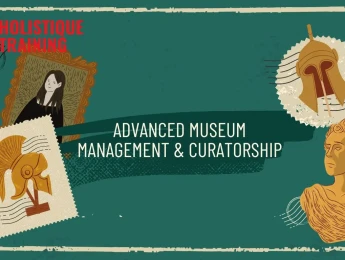Museums and galleries play a powerful part in educating society, as they can hold hundreds to thousands of years’ worth of cultural and natural history. This means that those who manage these historical objects have a great responsibility.
Museum management and curatorship work hand in hand in managing the museum's daily functions and processes. Curators manage museum displays, from researching an object to designing its exhibit and creating an engaging narrative to support its history. Museum management also encompasses the overall care and security of the exhibits, from maintaining the display through daily cleaning tasks, regular repairs and implementing various security measures to ensure its protection during and out of museum operating hours.
For a museum to be effective, it must also strongly focus on the customers and audience. To truly engage with the exhibit, the curators must focus on ideal ways to approach it, adjusting tone and language to suit the specific individual or group they are addressing best.
Upon completion of this course, participants will be able to:
- Understand the importance of museum management and curatorship.
- Identify the skills, roles and responsibilities required to be a successful curator within a modern museum and gallery.
- Explore what factors are included within museum management and how to ensure they all work effectively alongside one another.
- Recognise the consequences of poor museum management and curatorship.
- Incorporate museum and curation standards into the museum’s functions and processes.
- Select various objects and create coherent narratives that match their history or interpretation.
- Engage in constructive debates regarding the nature of curatorship and its evolution.
This course is designed for anyone who is responsible for curatorship or managing a museum or gallery. It would be most beneficial for:
- Curators
- Museum Directors
- Learning Coordinators
- Collections Managers
- Operations Managers
- Finance Advisors
- Exhibition Designers
This course uses a variety of adult learning styles to aid full understanding and comprehension. Participants will review real-world museum and gallery exhibits to highlight key design features that promote an engaging narrative to the audience.
Through a combination of presentations, demonstrations, group discussions, and practical activities, the participants can develop their knowledge and practical skills related to the content taught. Furthermore, they will partake in activities that allow them to create their exhibit design to share with their peers, allowing them to demonstrate their skills and receive positive and constructive feedback.
Day 5 of each course is reserved for a Q&A session, which may occur off-site. For 10-day courses, this also applies to day 10
Section 1: Fundamentals of Curatorship
- Defining curatorship and its necessity and importance within a museum or gallery.
- The key elements and stages of creating an exhibit – researching, designing, spaces and pitching the proposal.
- What skills, competencies, and responsibilities are involved in being a successful curator?
- Creating exciting and engaging narratives.
- Focusing on the audience and developing communication.
Section 2: Management and Strategies
- Exploring goals and expectations for the museum within a detailed action plan and utilising this to plan for success.
- What features are included within museum management – finances, research, preservation, communication, and education?
- Developing strategies to improve customer engagement, increase profits and better educate the public.
- Methods and techniques to aid in creating successful strategies.
Section 3: Communication and Education
- How museums and galleries facilitate learning and education.
- Engaging with different audiences through different communication styles.
- Aligning language, body language and tone to ensure exciting presentations that provide knowledge.
- Offering supporting narratives to exhibits that appeal to all different types of audiences.
- Different methods and techniques to provide a diverse and engaging education to ensure customer satisfaction.
Section 4: Collection Management
- Conducting regular and detailed assessments of each individual exhibit to identify faults or damages that need repair.
- Carrying out frequent and careful cleaning of exhibits.
- The process of object acquisition and accreditation and its vitality.
- Identifying when it’s necessary to remove an exhibit and the typical disposal process.
- Implement various security measures to protect the exhibits – CCTV, security guards, insurance, etc.
Section 5: Museums in Practice
- Ethics and morals surrounding various objects and exhibits – highly cultural or sacred objects.
- Displaying and expressing intangible culture.
- Politics surrounding display and object labelling.
- Utilising community focus groups to aid in exhibition planning and developing existing displays.
Upon successful completion of this training course, delegates will be awarded a Holistique Training Certificate of Completion. For those who attend and complete the online training course, a Holistique Training e-Certificate will be provided.
Holistique Training Certificates are accredited by the British Assessment Council (BAC) and The CPD Certification Service (CPD), and are certified under ISO 9001, ISO 21001, and ISO 29993 standards.
CPD credits for this course are granted by our Certificates and will be reflected on the Holistique Training Certificate of Completion. In accordance with the standards of The CPD Certification Service, one CPD credit is awarded per hour of course attendance. A maximum of 50 CPD credits can be claimed for any single course we currently offer.
- Course Code PO4-115
- Course Format Classroom, Online,
- Duration 5 days










